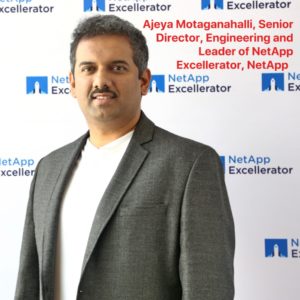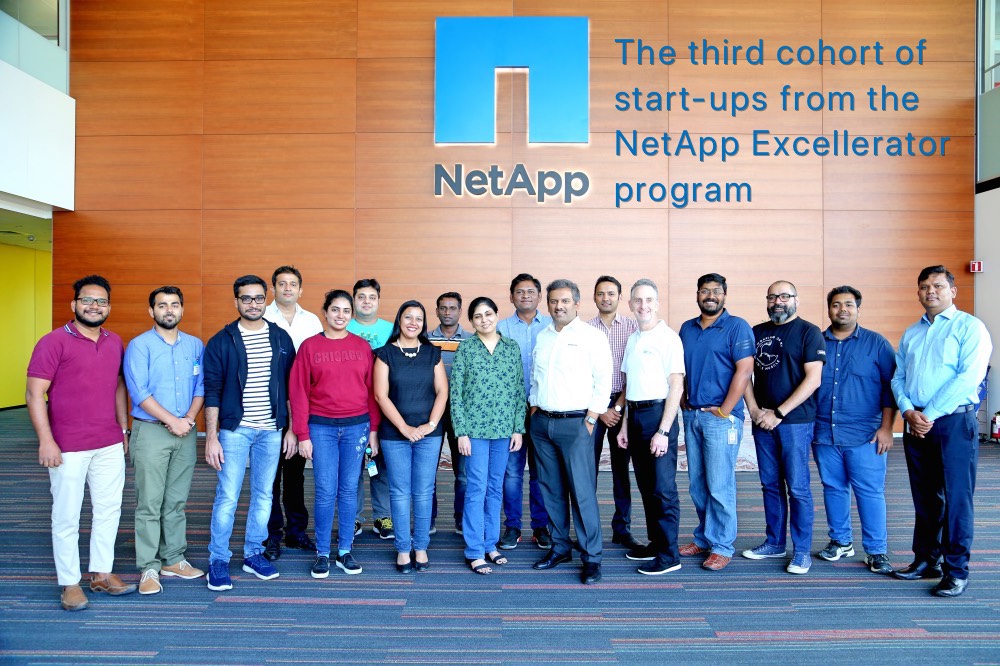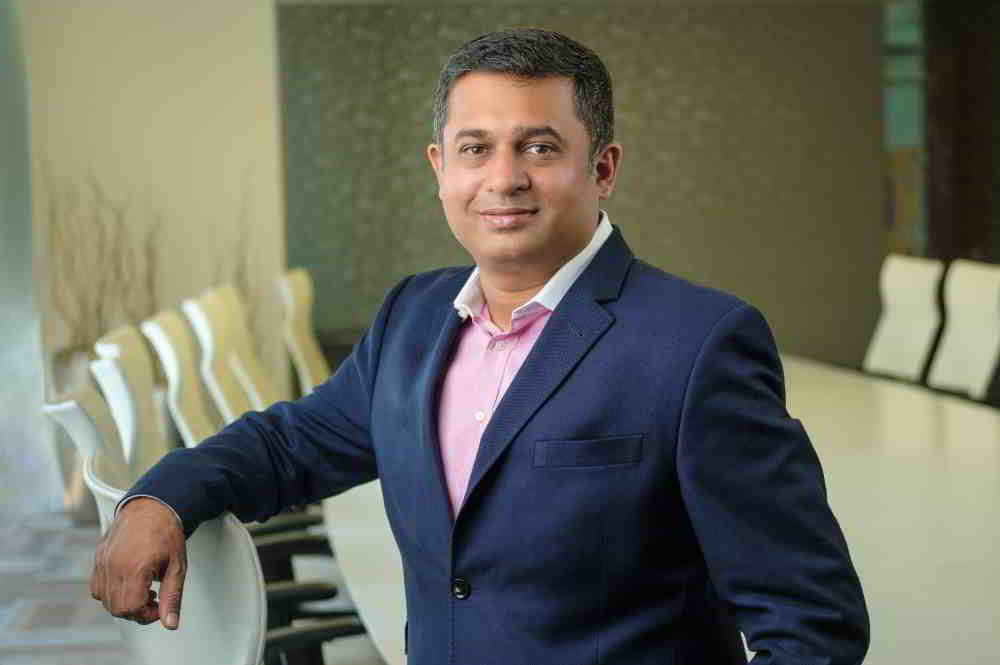Last year, India created eight unicorns and is now a top-ranking destination for start-ups and investors. US companies are keeping a keen eye on Indian start-ups and have even acquired some, ADYA being an example. NetApp is contributing to the start-up ecosystem by playing the role of technology validator. It has been running an accelerator program since June 2017, which has helped ADYA and other start-ups achieve success. This accelerator advises VCs about investment decisions in technology start-ups.
The NetApp Excellerator Program also helps start-ups create innovative market-ready products and solutions. These start-ups work in areas such as IoT, cloud, big data and analytics, machine learning, virtualization, data security, storage, data management, and other areas. The program is in its fourth cohort. For each cohort, NetApp selects six startups from hundreds of applications.
Ajeya Motaganahalli, Senior Director, Engineering and Leader of NetApp Excellerator, NetApp tells BRIAN PEREIRA what has changed since the first cohort. He spoke about the new introductions made to the accelerator program, the success stories of start-ups from past cohorts, and the rise of B2B start-ups.
Excerpts from the interview:
DC: What has changed since the first cohort? In terms of types of start-ups, industry expectations, and VC investments?

IMAGE CREDIT: NetApp
Ajeya Motaganahalli: For us, it is an ever-evolving journey. We have been through three cohorts and are about to start the fourth cohort, for which we received over 300 applications. Every cohort is a learning experience. We have graduated from a set of companies that were early-stage to companies to mid-stage — Pre-series A or Series-A companies. We see momentum with deep tech and B2B start-ups that are getting into the India ecosystem.
In the last three cohorts, I have seen this rapid evolution of the underlying technology take place. AI and machine learning are now table stakes and the foundational basis for start-ups; every new age start-up will be looking at those technologies. They could be into financials, data quality, or healthcare – but they want AI to constantly improve their efficiency, their ability, and accuracy. Starting from a trend, this has now become table stakes. I can’t find a start-up that does not employ some of those algorithms.
Some investors are only interested in investing in AI and machine learning start-ups.
In general, we are seeing a good mix of moving towards some of the B2B start-ups. India was predominantly known for B2C, and today all the big headlines come from there; the recent investment of Sachin Bansal in OLA Cabs being an example.
For B2B, look at some of our start-ups from the first cohort. ADYA was into cloud security. They got acquired by Qualis last month. Qualis is a US cybersecurity company.
We are seeing excellent traction in the market. The number of meetings we’ve had between the VCs and our start-ups has grown in the last 18 months. VCs are looking for technology validation from technology companies like NetApp. They understand that we don’t have a stake in these companies, but we are doing it from a technology fostering point of view.
There are many start-up ecosystems all over the world, in the US, China, Israel, UK, and India. Last year India created eight unicorns.

IMAGE CREDIT: NetApp
DC: Can you tell us a few success stories about the start-ups from the previous cohorts?
Ajeya Motaganahalli: From the first cohort, ADYA is a great success. Scalend, which is into data lakes, was also successful. They are a NetApp partner now and they have an active engagement with customers. LightMetrics is another very interesting company from the first cohort. They are into computer vision and help in ADAS (Advanced Driver Assisted Systems). They’ve found a lot of traction for their product in the US. They are doing phenomenally well. Their founders are technologists with Ph.D. degrees.
In the second cohort, we had a company called SigTuple Technologies. They raised a total funding of $25 million and are also doing very well.
BlobCity Inc open sourced their product to get more developers working on it. Their customer base includes prestigious global companies such as Jaguar Land Rover. They are also working with the World Bank.
We’ve had many great start-up companies in the third cohort, but one company that is making a big difference in India is Cardiotrack. They produced a pocket ECG device with similar dimensions as a smartphone. It has a 12 channel ECG and is as good as an ECG you would get in a hospital. All the computation and analytics happens in the cloud — so the accuracy of the measurements and the analytics will make it worthwhile. And it is economical for the end customer. Imagine a scheme like Ayushman Bharat pushed to rural health. These kind of things will get great traction.
RELATED STORIES
Why NetApp is nurturing data-centric startups through Excellerator
A visit to NetApp India’s Global Center of Excellence
DC: There’s a lot of interest in data-centric start-ups within India. Which industries are hungry for these data-centric start-ups?
Ajeya Motaganahalli: We are seeing a lot of demand from the insurance sector. There are a lot of claims that get processed; a lot of people apply, and people apply in two different names. There is a lot of data that can be crossed leveraged among companies that have done due diligence. There is a phenomenal opportunity in the insurance sector for data analytics.
One of the companies in our cohort, called Zscore, focuses on data quality. An insurance company collect lots of data from customers, and when they return a year later, it collects more data. But which data is useful and how do you use it to track things? What kind of minimal inputs do you need to settle claims? How do you find out false claims? The data that you need for that may only be a few lines, but you need to wade through 500 – 600 pages of notes to get that. Zscore will give you those actionable data insights with which you can quickly and accurately determine false claims, and process claims faster.
There is this company called Scalend that we incubated in the first cohort. They are in the banking space. They have technology that gives insights into customer profiles. It also gives the banks insights on the operational aspects of the business, so that they can take crucial business decisions. For instance, if footfalls at a branch are minimal, the bank could then decide to shut down the branch and just deploy an ATM for withdrawing money. What kind of business are these few customers engaging in? Can they be moved to Internet banking? This will save on operational costs.
This is not only for the insurance sector but could also be extended to the financial sector and to healthcare.
DC: Can you update us on the enhancements and new introductions in your accelerator program?
Ajeya Motaganahalli: We continue to make improvements and introduced new coaches. We started helping the start-ups understand their customers better by getting our customers to accompany them on customer visits. Our coaches are good at understanding customer requirements and translating that — and also to look for new businesses. It’s about understanding if the product can deliver value to a business and if it is a good fit.
Our start-ups are accompanied by our international coaches and do three to four calls with customers.
DC: How are you adding value and helping the start-ups that join your accelerator program?
Ajeya Motaganahalli: We help start-ups with legal awareness. We help them file patents, in raising funds, and explain to them how to create a term sheet.
We have a few law firms on our partner list, and we get them to conduct sessions for the start-ups. We also introduce them to these law firms and they can have a longer engagement.
They also struggle with choosing investors, when they are approached by multiple investors.
Thirdly, we advise a start-up when it wants to onboard a partner, like an advisor, in exchange for equity. It is hard to quantify the returns expected in exchange for that equity. So we discourage start-ups from doing that unless we are absolutely sure that they get value from those partnerships.
DC: There are organised start-up communities globally. How do you collaborate with them?
Ajeya Motaganahalli: We collaborate with 91Springboard and WeWork and do outreach programs with them; they are not competition.
We also collaborate with Nasscom (10K start-ups) to enrich the ecosystem. Some of the Nasscom start-ups apply and they get absorbed into our accelerator. We also sponsored Nasscom’s international outreach program — where they sponsored a start-up to go to the US.
| Cohort I | Cohort II | Cohort III |
| LightMetrics | ArchSaber | CloudOptimo |
| ADYA | SigTuple Technologies | InstaSafe |
| Vaultedge | Nanobi Data & Analytics | FirstHive |
| Vitacloud | Data Ken Technologies | Praktice.ai |
| EnCloudEn | BlobCity Inc | Cardiotrack |
| Scalend | Anlyz | Zcore Technologies |
SOURCE: NetApp









